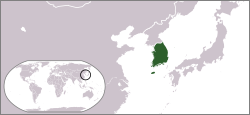Yushin Constitution
| Republic of Korea | ||||||||||
| 대한민국 大韓民國 |
||||||||||
|
||||||||||
|
||||||||||
|
Anthem 애국가 "Aegukga" |
||||||||||
| Capital | Seoul | |||||||||
| Languages | Korean | |||||||||
| Government | Authoritarian republic | |||||||||
| President | ||||||||||
| • | 1972–1979 | Park Chung-hee | ||||||||
| • | 1979–1980 | Choi Kyu-hah | ||||||||
| • | 1980–1981 | Chun Doo-hwan | ||||||||
| Prime Minister | ||||||||||
| • | 1972–1975 | Kim Jong-pil | ||||||||
| • | 1975–1979 | Choi Kyu-hah | ||||||||
| • | 1979–1980 | Shin Hyun-hwak | ||||||||
| • | 1980–1981 | Nam Duck-woo | ||||||||
| Legislature | National Assembly | |||||||||
| Historical era | Cold War | |||||||||
| • | Established | 1972 | ||||||||
| • | Disestablished | March 1981 | ||||||||
| Currency | Korean won | |||||||||
|
||||||||||
| Yusin Constitution | |
| Hangul | 유신 헌법 |
|---|---|
| Hanja | 維新憲法 |
| Revised Romanization | Yusin Heonbeop |
| McCune–Reischauer | Yusin Hŏnpŏp |
The Fourth Republic (Korean: 제4공화국; Hanja:第四共和國; Revised Romanisation: Je-sa Gonghwaguk) was the government of South Korea between 1972 and 1981, regulated by the Yusin Constitution adopted in October 1972 and confirmed in a referendum on 21 November 1972. From 1972 to 1979, power was monopolized by Park Chung Hee and his Democratic Republican Party under the highly centralized authoritarian "Yusin System". With the assassination of Park on 26 October 1979, the Republic entered a period of tumult and transition under the short-lived nominal presidency of Choi Kyu-hah, controlled under severe escalating martial law and witnessing the coup d'état of December Twelfth, the violent unfolding of the Gwangju Democratization Movement and its armed suppression, the coup d'état of May Seventeenth and presidency of Chun Doo-hwan, and finally the transition to the Fifth Republic under Chun in 1981.
This period also saw continued dramatic economic growth, following the government's five-year plans. The government invested heavily in heavy industries.
A variety of events in international diplomacy led the Park regime to reconsider its diplomatic position. Notable were the normalization of U.S. diplomatic relations with the People's Republic of China, which cast doubt on South Korea's ability to count on Cold War backing from the United States. The South Korean government began to establish diplomatic relations with many countries, such as Canada. In addition, the first round of Red Cross talks were held between South Korea and North Korea. Park also announced plans for eventual reunification.
...
Wikipedia



